Management and Operations: Leader and Manager Roles and Context
VerifiedAdded on 2020/12/29
|20
|5107
|412
Report
AI Summary
This report delves into the multifaceted roles of leaders and managers within the context of management and operations, using Tesco as a case study. It begins by defining and comparing the distinct responsibilities of leaders and managers, highlighting their contributions to productivity, innovation, and creativity. The report then explores how these roles adapt to various situational contexts, such as conflict management, process changes, and employee turnover. Furthermore, it examines different leadership theories, including transformational and situational leadership, evaluating their strengths and weaknesses. The report also outlines approaches to operations management, emphasizing the importance of this function and the factors influencing it. Overall, the report provides a comprehensive overview of leadership and management principles, offering insights into effective practices and strategies for organizational success.
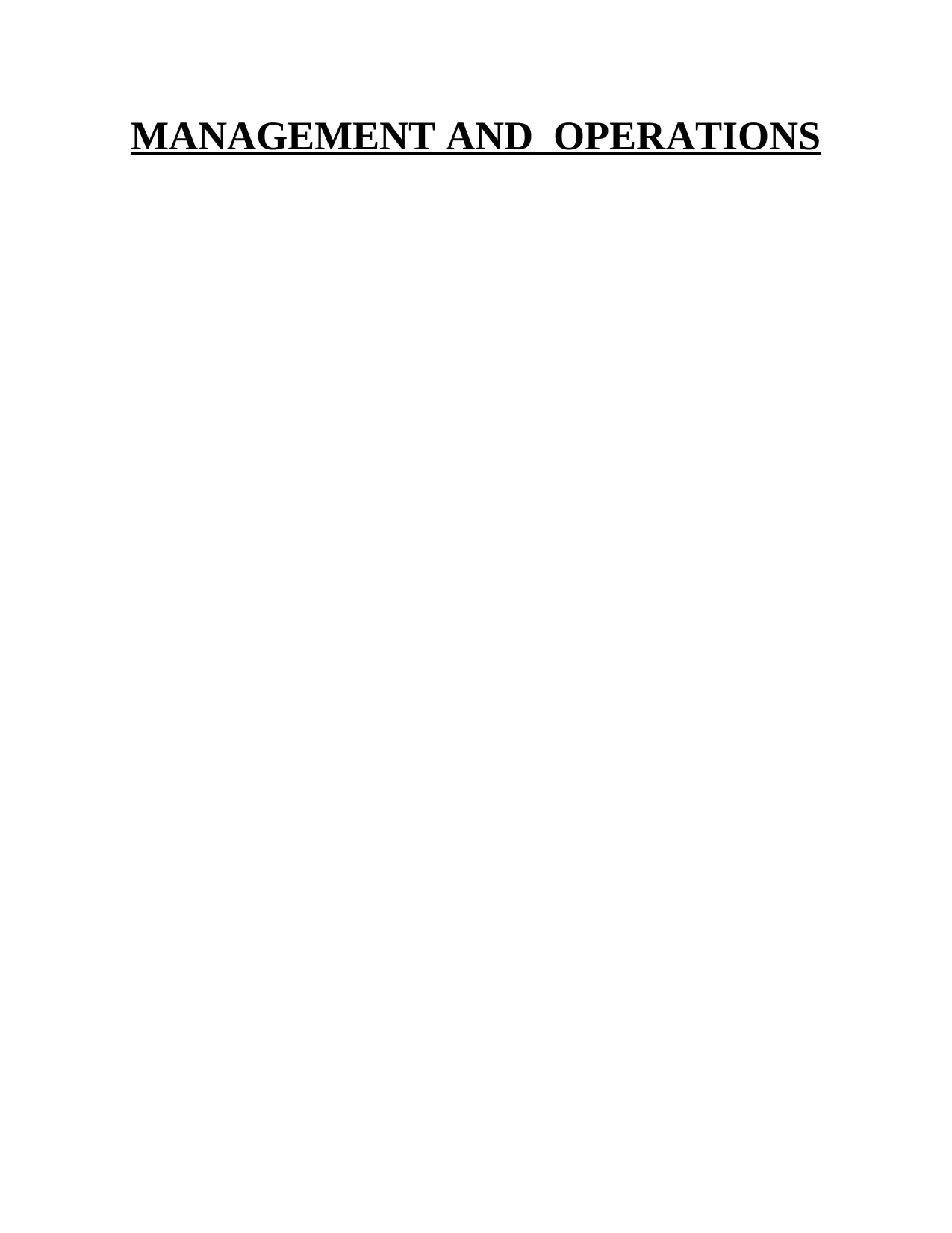
MANAGEMENT AND OPERATIONS
Paraphrase This Document
Need a fresh take? Get an instant paraphrase of this document with our AI Paraphraser
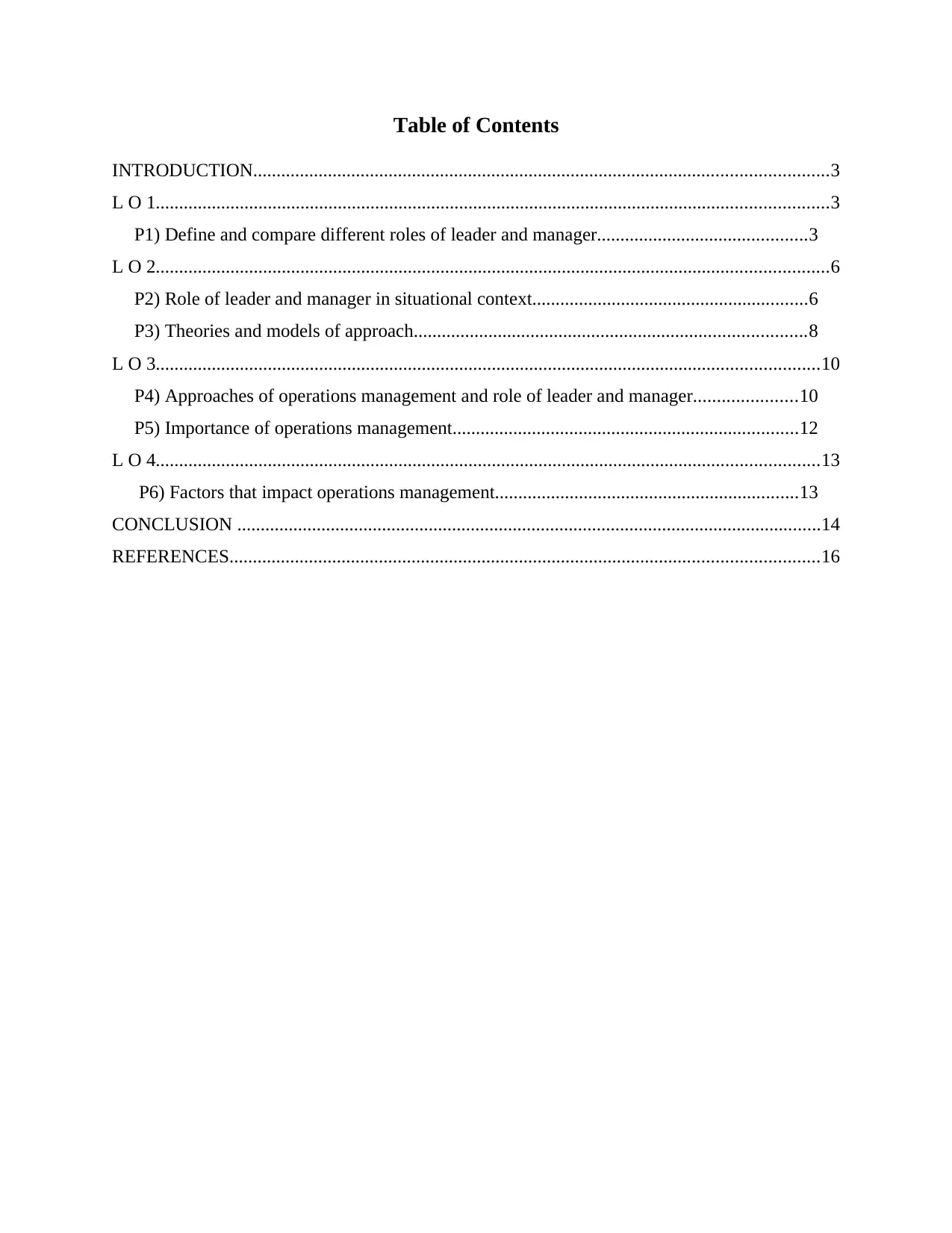
Table of Contents
INTRODUCTION...........................................................................................................................3
L O 1................................................................................................................................................3
P1) Define and compare different roles of leader and manager.............................................3
L O 2................................................................................................................................................6
P2) Role of leader and manager in situational context...........................................................6
P3) Theories and models of approach....................................................................................8
L O 3..............................................................................................................................................10
P4) Approaches of operations management and role of leader and manager......................10
P5) Importance of operations management..........................................................................12
L O 4..............................................................................................................................................13
P6) Factors that impact operations management.................................................................13
CONCLUSION .............................................................................................................................14
REFERENCES..............................................................................................................................16
INTRODUCTION...........................................................................................................................3
L O 1................................................................................................................................................3
P1) Define and compare different roles of leader and manager.............................................3
L O 2................................................................................................................................................6
P2) Role of leader and manager in situational context...........................................................6
P3) Theories and models of approach....................................................................................8
L O 3..............................................................................................................................................10
P4) Approaches of operations management and role of leader and manager......................10
P5) Importance of operations management..........................................................................12
L O 4..............................................................................................................................................13
P6) Factors that impact operations management.................................................................13
CONCLUSION .............................................................................................................................14
REFERENCES..............................................................................................................................16
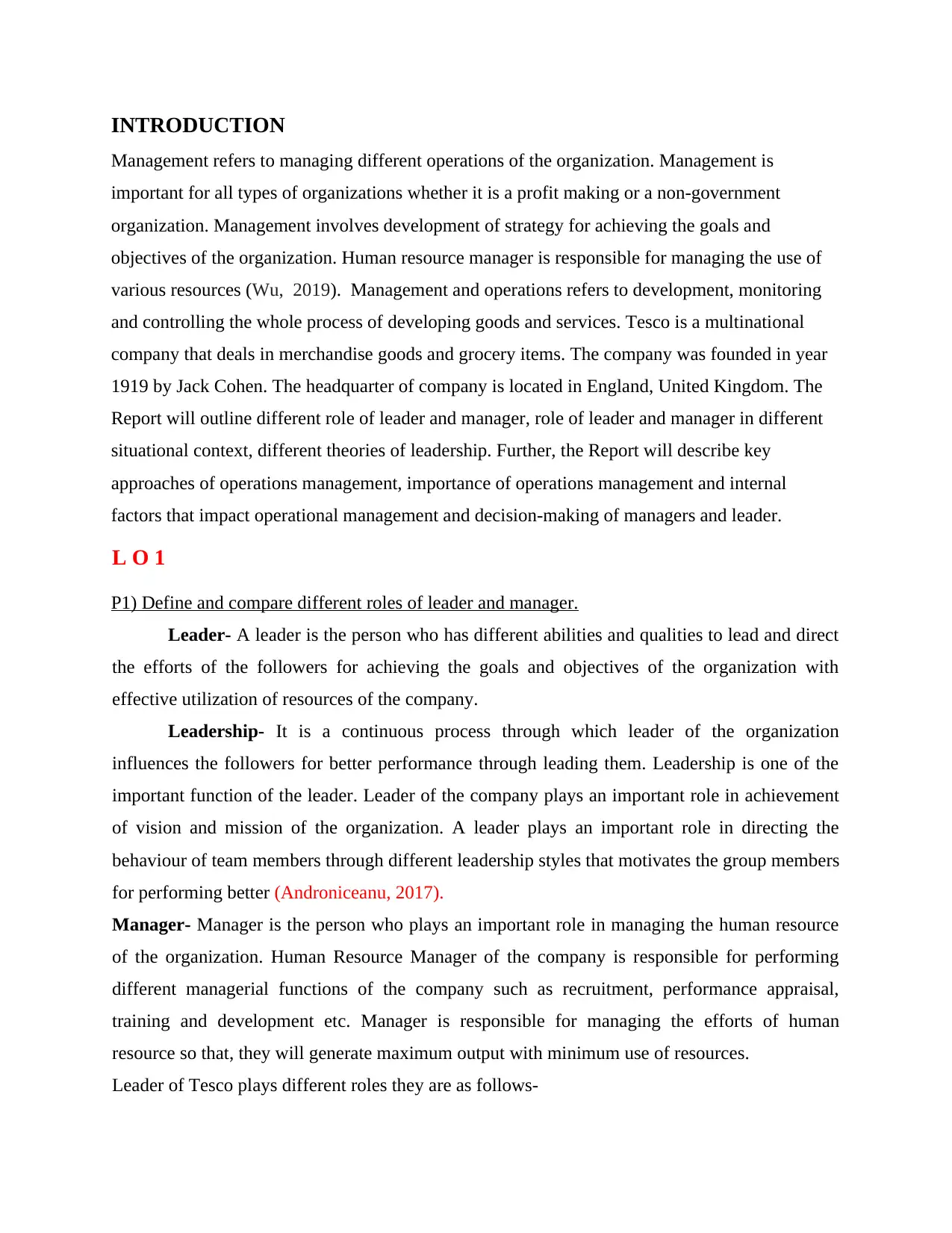
INTRODUCTION
Management refers to managing different operations of the organization. Management is
important for all types of organizations whether it is a profit making or a non-government
organization. Management involves development of strategy for achieving the goals and
objectives of the organization. Human resource manager is responsible for managing the use of
various resources (Wu, 2019). Management and operations refers to development, monitoring
and controlling the whole process of developing goods and services. Tesco is a multinational
company that deals in merchandise goods and grocery items. The company was founded in year
1919 by Jack Cohen. The headquarter of company is located in England, United Kingdom. The
Report will outline different role of leader and manager, role of leader and manager in different
situational context, different theories of leadership. Further, the Report will describe key
approaches of operations management, importance of operations management and internal
factors that impact operational management and decision-making of managers and leader.
L O 1
P1) Define and compare different roles of leader and manager.
Leader- A leader is the person who has different abilities and qualities to lead and direct
the efforts of the followers for achieving the goals and objectives of the organization with
effective utilization of resources of the company.
Leadership- It is a continuous process through which leader of the organization
influences the followers for better performance through leading them. Leadership is one of the
important function of the leader. Leader of the company plays an important role in achievement
of vision and mission of the organization. A leader plays an important role in directing the
behaviour of team members through different leadership styles that motivates the group members
for performing better (Androniceanu, 2017).
Manager- Manager is the person who plays an important role in managing the human resource
of the organization. Human Resource Manager of the company is responsible for performing
different managerial functions of the company such as recruitment, performance appraisal,
training and development etc. Manager is responsible for managing the efforts of human
resource so that, they will generate maximum output with minimum use of resources.
Leader of Tesco plays different roles they are as follows-
Management refers to managing different operations of the organization. Management is
important for all types of organizations whether it is a profit making or a non-government
organization. Management involves development of strategy for achieving the goals and
objectives of the organization. Human resource manager is responsible for managing the use of
various resources (Wu, 2019). Management and operations refers to development, monitoring
and controlling the whole process of developing goods and services. Tesco is a multinational
company that deals in merchandise goods and grocery items. The company was founded in year
1919 by Jack Cohen. The headquarter of company is located in England, United Kingdom. The
Report will outline different role of leader and manager, role of leader and manager in different
situational context, different theories of leadership. Further, the Report will describe key
approaches of operations management, importance of operations management and internal
factors that impact operational management and decision-making of managers and leader.
L O 1
P1) Define and compare different roles of leader and manager.
Leader- A leader is the person who has different abilities and qualities to lead and direct
the efforts of the followers for achieving the goals and objectives of the organization with
effective utilization of resources of the company.
Leadership- It is a continuous process through which leader of the organization
influences the followers for better performance through leading them. Leadership is one of the
important function of the leader. Leader of the company plays an important role in achievement
of vision and mission of the organization. A leader plays an important role in directing the
behaviour of team members through different leadership styles that motivates the group members
for performing better (Androniceanu, 2017).
Manager- Manager is the person who plays an important role in managing the human resource
of the organization. Human Resource Manager of the company is responsible for performing
different managerial functions of the company such as recruitment, performance appraisal,
training and development etc. Manager is responsible for managing the efforts of human
resource so that, they will generate maximum output with minimum use of resources.
Leader of Tesco plays different roles they are as follows-
⊘ This is a preview!⊘
Do you want full access?
Subscribe today to unlock all pages.

Trusted by 1+ million students worldwide
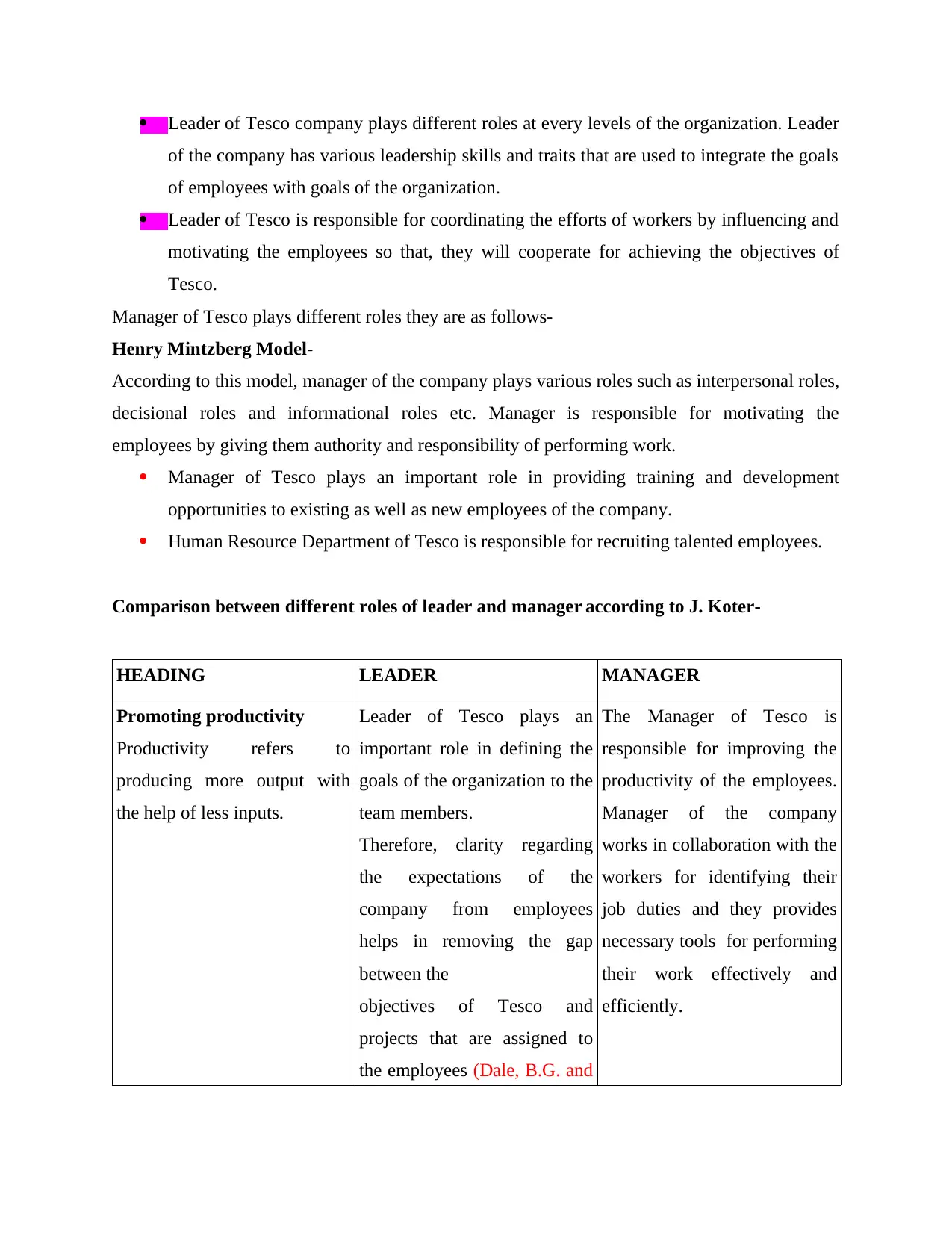
Leader of Tesco company plays different roles at every levels of the organization. Leader
of the company has various leadership skills and traits that are used to integrate the goals
of employees with goals of the organization.
Leader of Tesco is responsible for coordinating the efforts of workers by influencing and
motivating the employees so that, they will cooperate for achieving the objectives of
Tesco.
Manager of Tesco plays different roles they are as follows-
Henry Mintzberg Model-
According to this model, manager of the company plays various roles such as interpersonal roles,
decisional roles and informational roles etc. Manager is responsible for motivating the
employees by giving them authority and responsibility of performing work.
Manager of Tesco plays an important role in providing training and development
opportunities to existing as well as new employees of the company.
Human Resource Department of Tesco is responsible for recruiting talented employees.
Comparison between different roles of leader and manager according to J. Koter-
HEADING LEADER MANAGER
Promoting productivity
Productivity refers to
producing more output with
the help of less inputs.
Leader of Tesco plays an
important role in defining the
goals of the organization to the
team members.
Therefore, clarity regarding
the expectations of the
company from employees
helps in removing the gap
between the
objectives of Tesco and
projects that are assigned to
the employees (Dale, B.G. and
The Manager of Tesco is
responsible for improving the
productivity of the employees.
Manager of the company
works in collaboration with the
workers for identifying their
job duties and they provides
necessary tools for performing
their work effectively and
efficiently.
of the company has various leadership skills and traits that are used to integrate the goals
of employees with goals of the organization.
Leader of Tesco is responsible for coordinating the efforts of workers by influencing and
motivating the employees so that, they will cooperate for achieving the objectives of
Tesco.
Manager of Tesco plays different roles they are as follows-
Henry Mintzberg Model-
According to this model, manager of the company plays various roles such as interpersonal roles,
decisional roles and informational roles etc. Manager is responsible for motivating the
employees by giving them authority and responsibility of performing work.
Manager of Tesco plays an important role in providing training and development
opportunities to existing as well as new employees of the company.
Human Resource Department of Tesco is responsible for recruiting talented employees.
Comparison between different roles of leader and manager according to J. Koter-
HEADING LEADER MANAGER
Promoting productivity
Productivity refers to
producing more output with
the help of less inputs.
Leader of Tesco plays an
important role in defining the
goals of the organization to the
team members.
Therefore, clarity regarding
the expectations of the
company from employees
helps in removing the gap
between the
objectives of Tesco and
projects that are assigned to
the employees (Dale, B.G. and
The Manager of Tesco is
responsible for improving the
productivity of the employees.
Manager of the company
works in collaboration with the
workers for identifying their
job duties and they provides
necessary tools for performing
their work effectively and
efficiently.
Paraphrase This Document
Need a fresh take? Get an instant paraphrase of this document with our AI Paraphraser
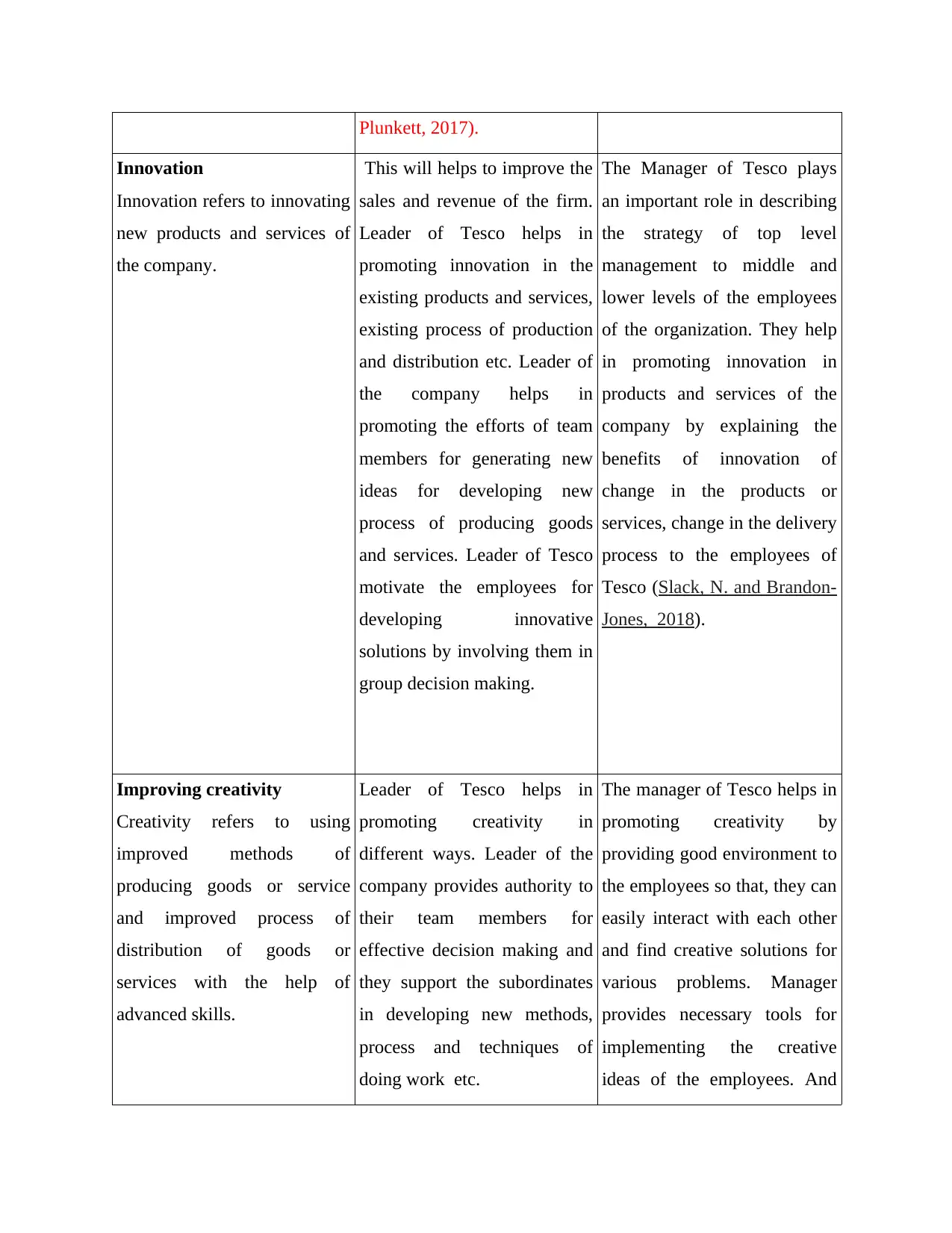
Plunkett, 2017).
Innovation
Innovation refers to innovating
new products and services of
the company.
This will helps to improve the
sales and revenue of the firm.
Leader of Tesco helps in
promoting innovation in the
existing products and services,
existing process of production
and distribution etc. Leader of
the company helps in
promoting the efforts of team
members for generating new
ideas for developing new
process of producing goods
and services. Leader of Tesco
motivate the employees for
developing innovative
solutions by involving them in
group decision making.
The Manager of Tesco plays
an important role in describing
the strategy of top level
management to middle and
lower levels of the employees
of the organization. They help
in promoting innovation in
products and services of the
company by explaining the
benefits of innovation of
change in the products or
services, change in the delivery
process to the employees of
Tesco (Slack, N. and Brandon-
Jones, 2018).
Improving creativity
Creativity refers to using
improved methods of
producing goods or service
and improved process of
distribution of goods or
services with the help of
advanced skills.
Leader of Tesco helps in
promoting creativity in
different ways. Leader of the
company provides authority to
their team members for
effective decision making and
they support the subordinates
in developing new methods,
process and techniques of
doing work etc.
The manager of Tesco helps in
promoting creativity by
providing good environment to
the employees so that, they can
easily interact with each other
and find creative solutions for
various problems. Manager
provides necessary tools for
implementing the creative
ideas of the employees. And
Innovation
Innovation refers to innovating
new products and services of
the company.
This will helps to improve the
sales and revenue of the firm.
Leader of Tesco helps in
promoting innovation in the
existing products and services,
existing process of production
and distribution etc. Leader of
the company helps in
promoting the efforts of team
members for generating new
ideas for developing new
process of producing goods
and services. Leader of Tesco
motivate the employees for
developing innovative
solutions by involving them in
group decision making.
The Manager of Tesco plays
an important role in describing
the strategy of top level
management to middle and
lower levels of the employees
of the organization. They help
in promoting innovation in
products and services of the
company by explaining the
benefits of innovation of
change in the products or
services, change in the delivery
process to the employees of
Tesco (Slack, N. and Brandon-
Jones, 2018).
Improving creativity
Creativity refers to using
improved methods of
producing goods or service
and improved process of
distribution of goods or
services with the help of
advanced skills.
Leader of Tesco helps in
promoting creativity in
different ways. Leader of the
company provides authority to
their team members for
effective decision making and
they support the subordinates
in developing new methods,
process and techniques of
doing work etc.
The manager of Tesco helps in
promoting creativity by
providing good environment to
the employees so that, they can
easily interact with each other
and find creative solutions for
various problems. Manager
provides necessary tools for
implementing the creative
ideas of the employees. And
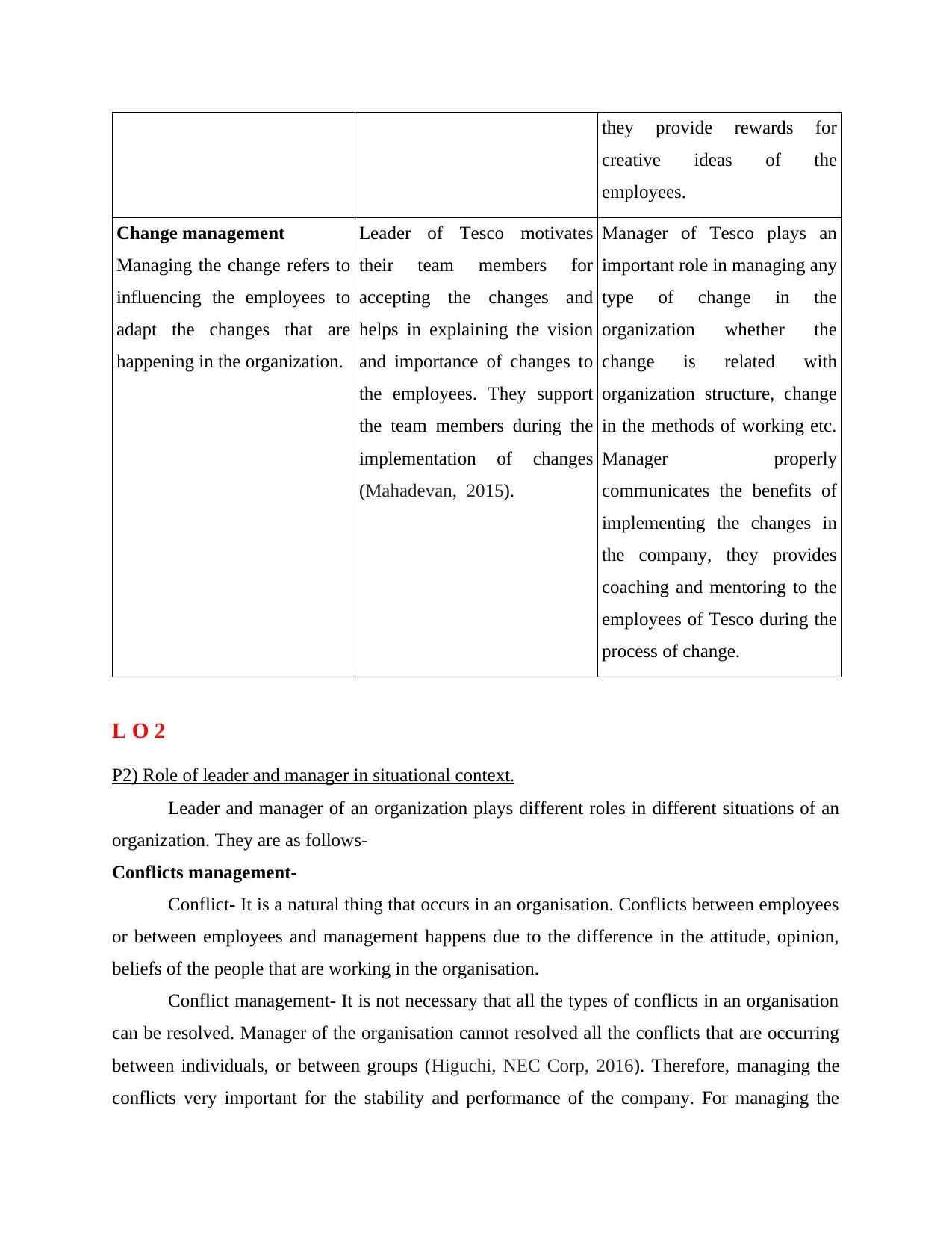
they provide rewards for
creative ideas of the
employees.
Change management
Managing the change refers to
influencing the employees to
adapt the changes that are
happening in the organization.
Leader of Tesco motivates
their team members for
accepting the changes and
helps in explaining the vision
and importance of changes to
the employees. They support
the team members during the
implementation of changes
(Mahadevan, 2015).
Manager of Tesco plays an
important role in managing any
type of change in the
organization whether the
change is related with
organization structure, change
in the methods of working etc.
Manager properly
communicates the benefits of
implementing the changes in
the company, they provides
coaching and mentoring to the
employees of Tesco during the
process of change.
L O 2
P2) Role of leader and manager in situational context.
Leader and manager of an organization plays different roles in different situations of an
organization. They are as follows-
Conflicts management-
Conflict- It is a natural thing that occurs in an organisation. Conflicts between employees
or between employees and management happens due to the difference in the attitude, opinion,
beliefs of the people that are working in the organisation.
Conflict management- It is not necessary that all the types of conflicts in an organisation
can be resolved. Manager of the organisation cannot resolved all the conflicts that are occurring
between individuals, or between groups (Higuchi, NEC Corp, 2016). Therefore, managing the
conflicts very important for the stability and performance of the company. For managing the
creative ideas of the
employees.
Change management
Managing the change refers to
influencing the employees to
adapt the changes that are
happening in the organization.
Leader of Tesco motivates
their team members for
accepting the changes and
helps in explaining the vision
and importance of changes to
the employees. They support
the team members during the
implementation of changes
(Mahadevan, 2015).
Manager of Tesco plays an
important role in managing any
type of change in the
organization whether the
change is related with
organization structure, change
in the methods of working etc.
Manager properly
communicates the benefits of
implementing the changes in
the company, they provides
coaching and mentoring to the
employees of Tesco during the
process of change.
L O 2
P2) Role of leader and manager in situational context.
Leader and manager of an organization plays different roles in different situations of an
organization. They are as follows-
Conflicts management-
Conflict- It is a natural thing that occurs in an organisation. Conflicts between employees
or between employees and management happens due to the difference in the attitude, opinion,
beliefs of the people that are working in the organisation.
Conflict management- It is not necessary that all the types of conflicts in an organisation
can be resolved. Manager of the organisation cannot resolved all the conflicts that are occurring
between individuals, or between groups (Higuchi, NEC Corp, 2016). Therefore, managing the
conflicts very important for the stability and performance of the company. For managing the
⊘ This is a preview!⊘
Do you want full access?
Subscribe today to unlock all pages.

Trusted by 1+ million students worldwide
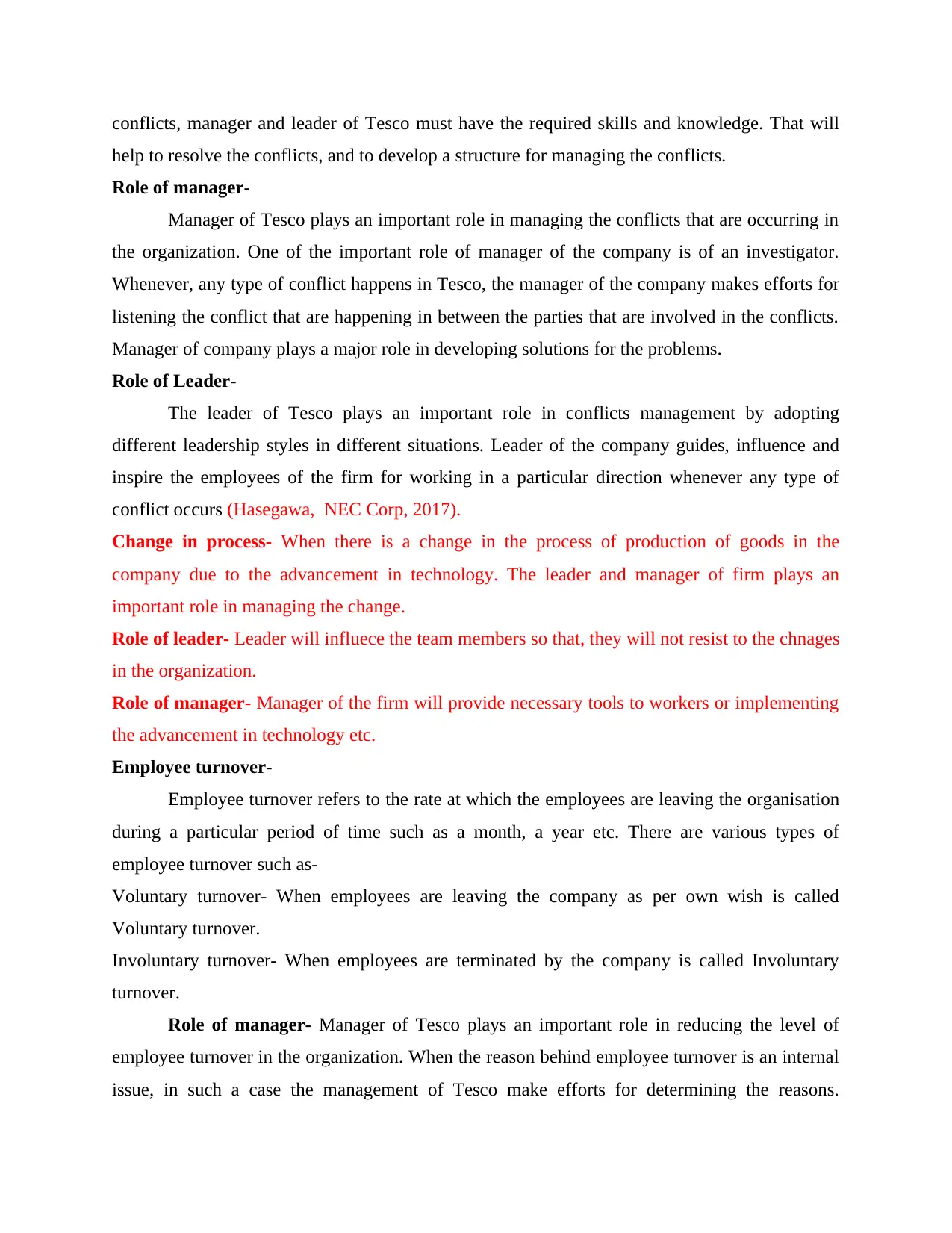
conflicts, manager and leader of Tesco must have the required skills and knowledge. That will
help to resolve the conflicts, and to develop a structure for managing the conflicts.
Role of manager-
Manager of Tesco plays an important role in managing the conflicts that are occurring in
the organization. One of the important role of manager of the company is of an investigator.
Whenever, any type of conflict happens in Tesco, the manager of the company makes efforts for
listening the conflict that are happening in between the parties that are involved in the conflicts.
Manager of company plays a major role in developing solutions for the problems.
Role of Leader-
The leader of Tesco plays an important role in conflicts management by adopting
different leadership styles in different situations. Leader of the company guides, influence and
inspire the employees of the firm for working in a particular direction whenever any type of
conflict occurs (Hasegawa, NEC Corp, 2017).
Change in process- When there is a change in the process of production of goods in the
company due to the advancement in technology. The leader and manager of firm plays an
important role in managing the change.
Role of leader- Leader will influece the team members so that, they will not resist to the chnages
in the organization.
Role of manager- Manager of the firm will provide necessary tools to workers or implementing
the advancement in technology etc.
Employee turnover-
Employee turnover refers to the rate at which the employees are leaving the organisation
during a particular period of time such as a month, a year etc. There are various types of
employee turnover such as-
Voluntary turnover- When employees are leaving the company as per own wish is called
Voluntary turnover.
Involuntary turnover- When employees are terminated by the company is called Involuntary
turnover.
Role of manager- Manager of Tesco plays an important role in reducing the level of
employee turnover in the organization. When the reason behind employee turnover is an internal
issue, in such a case the management of Tesco make efforts for determining the reasons.
help to resolve the conflicts, and to develop a structure for managing the conflicts.
Role of manager-
Manager of Tesco plays an important role in managing the conflicts that are occurring in
the organization. One of the important role of manager of the company is of an investigator.
Whenever, any type of conflict happens in Tesco, the manager of the company makes efforts for
listening the conflict that are happening in between the parties that are involved in the conflicts.
Manager of company plays a major role in developing solutions for the problems.
Role of Leader-
The leader of Tesco plays an important role in conflicts management by adopting
different leadership styles in different situations. Leader of the company guides, influence and
inspire the employees of the firm for working in a particular direction whenever any type of
conflict occurs (Hasegawa, NEC Corp, 2017).
Change in process- When there is a change in the process of production of goods in the
company due to the advancement in technology. The leader and manager of firm plays an
important role in managing the change.
Role of leader- Leader will influece the team members so that, they will not resist to the chnages
in the organization.
Role of manager- Manager of the firm will provide necessary tools to workers or implementing
the advancement in technology etc.
Employee turnover-
Employee turnover refers to the rate at which the employees are leaving the organisation
during a particular period of time such as a month, a year etc. There are various types of
employee turnover such as-
Voluntary turnover- When employees are leaving the company as per own wish is called
Voluntary turnover.
Involuntary turnover- When employees are terminated by the company is called Involuntary
turnover.
Role of manager- Manager of Tesco plays an important role in reducing the level of
employee turnover in the organization. When the reason behind employee turnover is an internal
issue, in such a case the management of Tesco make efforts for determining the reasons.
Paraphrase This Document
Need a fresh take? Get an instant paraphrase of this document with our AI Paraphraser
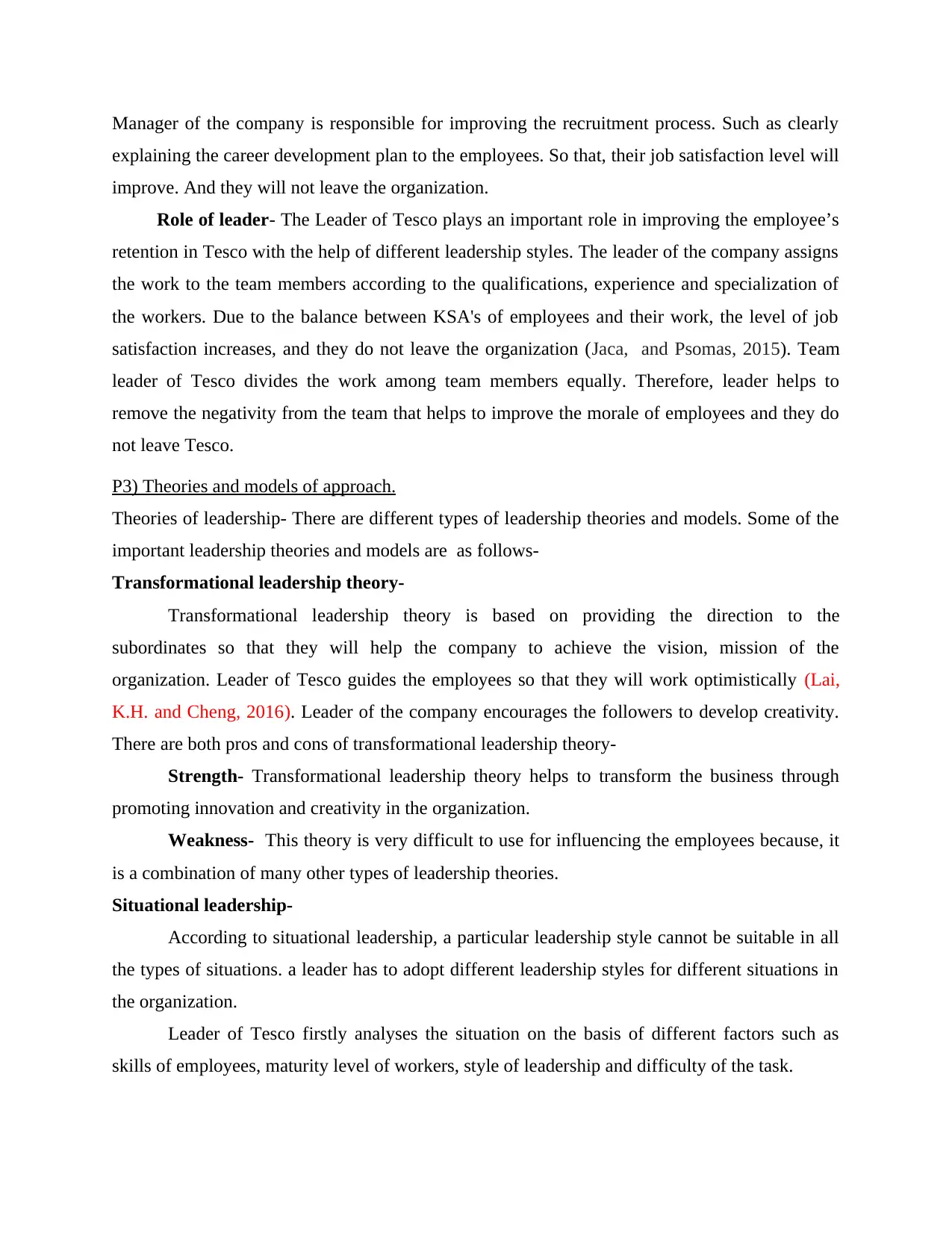
Manager of the company is responsible for improving the recruitment process. Such as clearly
explaining the career development plan to the employees. So that, their job satisfaction level will
improve. And they will not leave the organization.
Role of leader- The Leader of Tesco plays an important role in improving the employee’s
retention in Tesco with the help of different leadership styles. The leader of the company assigns
the work to the team members according to the qualifications, experience and specialization of
the workers. Due to the balance between KSA's of employees and their work, the level of job
satisfaction increases, and they do not leave the organization (Jaca, and Psomas, 2015). Team
leader of Tesco divides the work among team members equally. Therefore, leader helps to
remove the negativity from the team that helps to improve the morale of employees and they do
not leave Tesco.
P3) Theories and models of approach.
Theories of leadership- There are different types of leadership theories and models. Some of the
important leadership theories and models are as follows-
Transformational leadership theory-
Transformational leadership theory is based on providing the direction to the
subordinates so that they will help the company to achieve the vision, mission of the
organization. Leader of Tesco guides the employees so that they will work optimistically (Lai,
K.H. and Cheng, 2016). Leader of the company encourages the followers to develop creativity.
There are both pros and cons of transformational leadership theory-
Strength- Transformational leadership theory helps to transform the business through
promoting innovation and creativity in the organization.
Weakness- This theory is very difficult to use for influencing the employees because, it
is a combination of many other types of leadership theories.
Situational leadership-
According to situational leadership, a particular leadership style cannot be suitable in all
the types of situations. a leader has to adopt different leadership styles for different situations in
the organization.
Leader of Tesco firstly analyses the situation on the basis of different factors such as
skills of employees, maturity level of workers, style of leadership and difficulty of the task.
explaining the career development plan to the employees. So that, their job satisfaction level will
improve. And they will not leave the organization.
Role of leader- The Leader of Tesco plays an important role in improving the employee’s
retention in Tesco with the help of different leadership styles. The leader of the company assigns
the work to the team members according to the qualifications, experience and specialization of
the workers. Due to the balance between KSA's of employees and their work, the level of job
satisfaction increases, and they do not leave the organization (Jaca, and Psomas, 2015). Team
leader of Tesco divides the work among team members equally. Therefore, leader helps to
remove the negativity from the team that helps to improve the morale of employees and they do
not leave Tesco.
P3) Theories and models of approach.
Theories of leadership- There are different types of leadership theories and models. Some of the
important leadership theories and models are as follows-
Transformational leadership theory-
Transformational leadership theory is based on providing the direction to the
subordinates so that they will help the company to achieve the vision, mission of the
organization. Leader of Tesco guides the employees so that they will work optimistically (Lai,
K.H. and Cheng, 2016). Leader of the company encourages the followers to develop creativity.
There are both pros and cons of transformational leadership theory-
Strength- Transformational leadership theory helps to transform the business through
promoting innovation and creativity in the organization.
Weakness- This theory is very difficult to use for influencing the employees because, it
is a combination of many other types of leadership theories.
Situational leadership-
According to situational leadership, a particular leadership style cannot be suitable in all
the types of situations. a leader has to adopt different leadership styles for different situations in
the organization.
Leader of Tesco firstly analyses the situation on the basis of different factors such as
skills of employees, maturity level of workers, style of leadership and difficulty of the task.
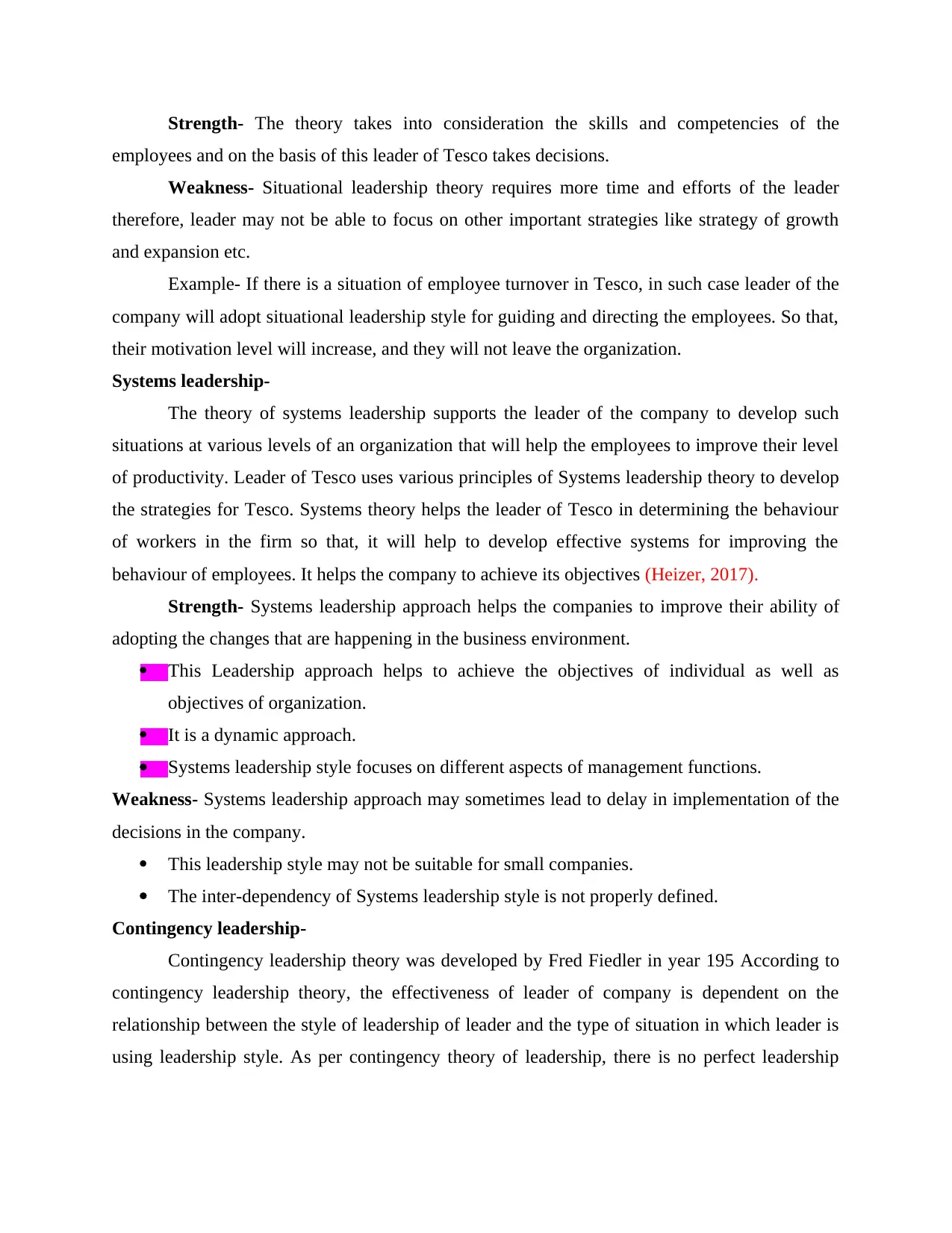
Strength- The theory takes into consideration the skills and competencies of the
employees and on the basis of this leader of Tesco takes decisions.
Weakness- Situational leadership theory requires more time and efforts of the leader
therefore, leader may not be able to focus on other important strategies like strategy of growth
and expansion etc.
Example- If there is a situation of employee turnover in Tesco, in such case leader of the
company will adopt situational leadership style for guiding and directing the employees. So that,
their motivation level will increase, and they will not leave the organization.
Systems leadership-
The theory of systems leadership supports the leader of the company to develop such
situations at various levels of an organization that will help the employees to improve their level
of productivity. Leader of Tesco uses various principles of Systems leadership theory to develop
the strategies for Tesco. Systems theory helps the leader of Tesco in determining the behaviour
of workers in the firm so that, it will help to develop effective systems for improving the
behaviour of employees. It helps the company to achieve its objectives (Heizer, 2017).
Strength- Systems leadership approach helps the companies to improve their ability of
adopting the changes that are happening in the business environment.
This Leadership approach helps to achieve the objectives of individual as well as
objectives of organization.
It is a dynamic approach.
Systems leadership style focuses on different aspects of management functions.
Weakness- Systems leadership approach may sometimes lead to delay in implementation of the
decisions in the company.
This leadership style may not be suitable for small companies.
The inter-dependency of Systems leadership style is not properly defined.
Contingency leadership-
Contingency leadership theory was developed by Fred Fiedler in year 195 According to
contingency leadership theory, the effectiveness of leader of company is dependent on the
relationship between the style of leadership of leader and the type of situation in which leader is
using leadership style. As per contingency theory of leadership, there is no perfect leadership
employees and on the basis of this leader of Tesco takes decisions.
Weakness- Situational leadership theory requires more time and efforts of the leader
therefore, leader may not be able to focus on other important strategies like strategy of growth
and expansion etc.
Example- If there is a situation of employee turnover in Tesco, in such case leader of the
company will adopt situational leadership style for guiding and directing the employees. So that,
their motivation level will increase, and they will not leave the organization.
Systems leadership-
The theory of systems leadership supports the leader of the company to develop such
situations at various levels of an organization that will help the employees to improve their level
of productivity. Leader of Tesco uses various principles of Systems leadership theory to develop
the strategies for Tesco. Systems theory helps the leader of Tesco in determining the behaviour
of workers in the firm so that, it will help to develop effective systems for improving the
behaviour of employees. It helps the company to achieve its objectives (Heizer, 2017).
Strength- Systems leadership approach helps the companies to improve their ability of
adopting the changes that are happening in the business environment.
This Leadership approach helps to achieve the objectives of individual as well as
objectives of organization.
It is a dynamic approach.
Systems leadership style focuses on different aspects of management functions.
Weakness- Systems leadership approach may sometimes lead to delay in implementation of the
decisions in the company.
This leadership style may not be suitable for small companies.
The inter-dependency of Systems leadership style is not properly defined.
Contingency leadership-
Contingency leadership theory was developed by Fred Fiedler in year 195 According to
contingency leadership theory, the effectiveness of leader of company is dependent on the
relationship between the style of leadership of leader and the type of situation in which leader is
using leadership style. As per contingency theory of leadership, there is no perfect leadership
⊘ This is a preview!⊘
Do you want full access?
Subscribe today to unlock all pages.

Trusted by 1+ million students worldwide
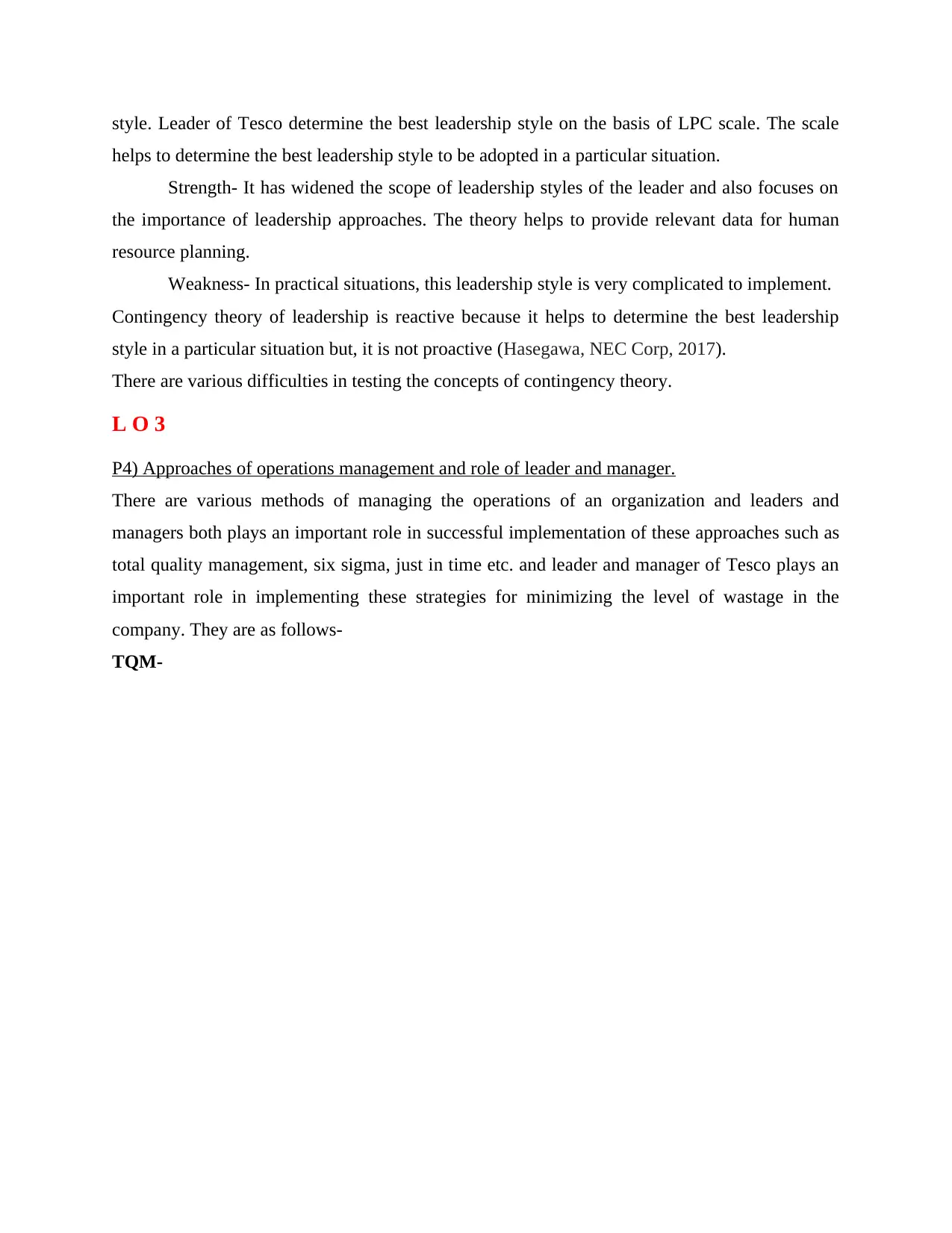
style. Leader of Tesco determine the best leadership style on the basis of LPC scale. The scale
helps to determine the best leadership style to be adopted in a particular situation.
Strength- It has widened the scope of leadership styles of the leader and also focuses on
the importance of leadership approaches. The theory helps to provide relevant data for human
resource planning.
Weakness- In practical situations, this leadership style is very complicated to implement.
Contingency theory of leadership is reactive because it helps to determine the best leadership
style in a particular situation but, it is not proactive (Hasegawa, NEC Corp, 2017).
There are various difficulties in testing the concepts of contingency theory.
L O 3
P4) Approaches of operations management and role of leader and manager.
There are various methods of managing the operations of an organization and leaders and
managers both plays an important role in successful implementation of these approaches such as
total quality management, six sigma, just in time etc. and leader and manager of Tesco plays an
important role in implementing these strategies for minimizing the level of wastage in the
company. They are as follows-
TQM-
helps to determine the best leadership style to be adopted in a particular situation.
Strength- It has widened the scope of leadership styles of the leader and also focuses on
the importance of leadership approaches. The theory helps to provide relevant data for human
resource planning.
Weakness- In practical situations, this leadership style is very complicated to implement.
Contingency theory of leadership is reactive because it helps to determine the best leadership
style in a particular situation but, it is not proactive (Hasegawa, NEC Corp, 2017).
There are various difficulties in testing the concepts of contingency theory.
L O 3
P4) Approaches of operations management and role of leader and manager.
There are various methods of managing the operations of an organization and leaders and
managers both plays an important role in successful implementation of these approaches such as
total quality management, six sigma, just in time etc. and leader and manager of Tesco plays an
important role in implementing these strategies for minimizing the level of wastage in the
company. They are as follows-
TQM-
Paraphrase This Document
Need a fresh take? Get an instant paraphrase of this document with our AI Paraphraser
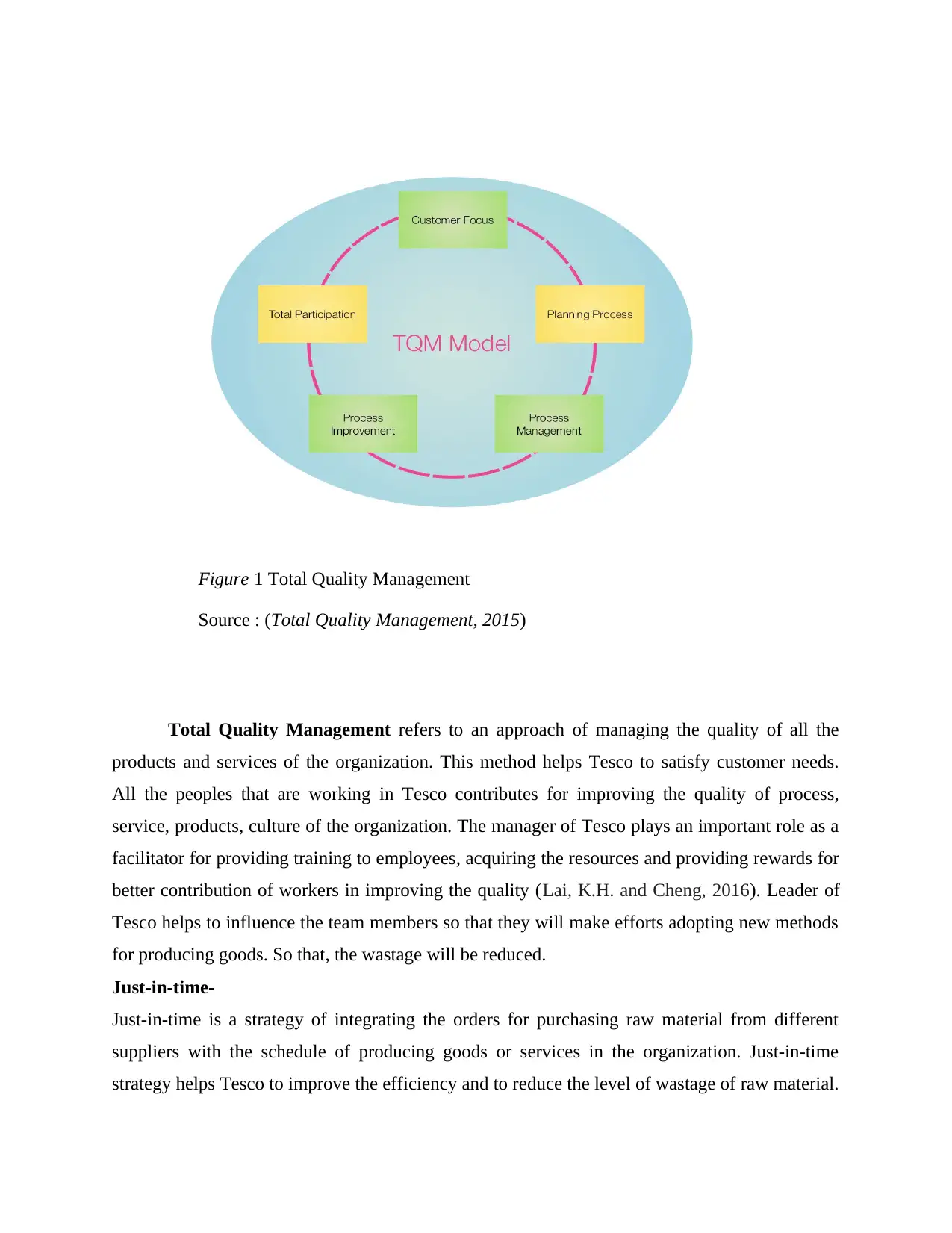
Total Quality Management refers to an approach of managing the quality of all the
products and services of the organization. This method helps Tesco to satisfy customer needs.
All the peoples that are working in Tesco contributes for improving the quality of process,
service, products, culture of the organization. The manager of Tesco plays an important role as a
facilitator for providing training to employees, acquiring the resources and providing rewards for
better contribution of workers in improving the quality (Lai, K.H. and Cheng, 2016). Leader of
Tesco helps to influence the team members so that they will make efforts adopting new methods
for producing goods. So that, the wastage will be reduced.
Just-in-time-
Just-in-time is a strategy of integrating the orders for purchasing raw material from different
suppliers with the schedule of producing goods or services in the organization. Just-in-time
strategy helps Tesco to improve the efficiency and to reduce the level of wastage of raw material.
Figure 1 Total Quality Management
Source : (Total Quality Management, 2015)
products and services of the organization. This method helps Tesco to satisfy customer needs.
All the peoples that are working in Tesco contributes for improving the quality of process,
service, products, culture of the organization. The manager of Tesco plays an important role as a
facilitator for providing training to employees, acquiring the resources and providing rewards for
better contribution of workers in improving the quality (Lai, K.H. and Cheng, 2016). Leader of
Tesco helps to influence the team members so that they will make efforts adopting new methods
for producing goods. So that, the wastage will be reduced.
Just-in-time-
Just-in-time is a strategy of integrating the orders for purchasing raw material from different
suppliers with the schedule of producing goods or services in the organization. Just-in-time
strategy helps Tesco to improve the efficiency and to reduce the level of wastage of raw material.
Figure 1 Total Quality Management
Source : (Total Quality Management, 2015)
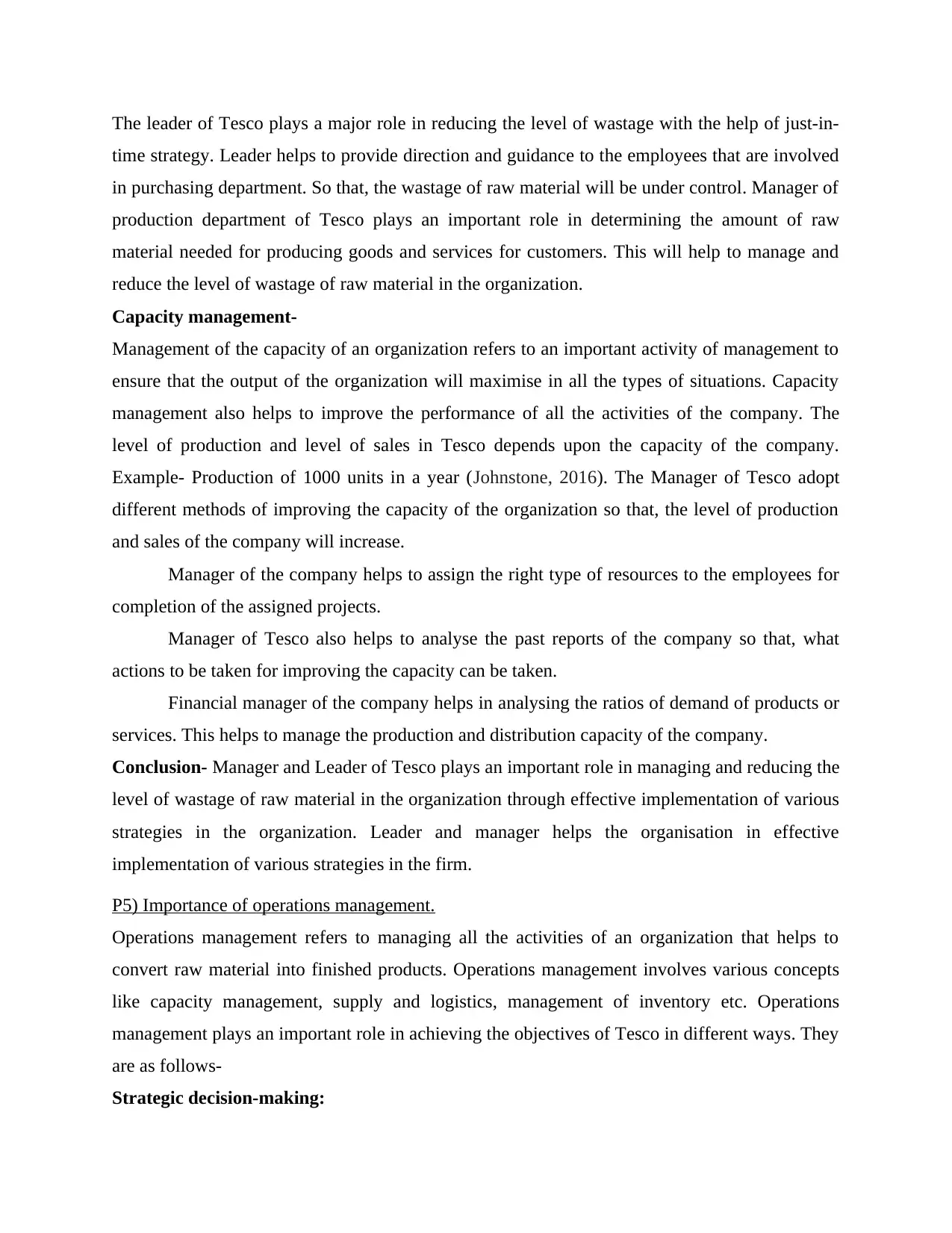
The leader of Tesco plays a major role in reducing the level of wastage with the help of just-in-
time strategy. Leader helps to provide direction and guidance to the employees that are involved
in purchasing department. So that, the wastage of raw material will be under control. Manager of
production department of Tesco plays an important role in determining the amount of raw
material needed for producing goods and services for customers. This will help to manage and
reduce the level of wastage of raw material in the organization.
Capacity management-
Management of the capacity of an organization refers to an important activity of management to
ensure that the output of the organization will maximise in all the types of situations. Capacity
management also helps to improve the performance of all the activities of the company. The
level of production and level of sales in Tesco depends upon the capacity of the company.
Example- Production of 1000 units in a year (Johnstone, 2016). The Manager of Tesco adopt
different methods of improving the capacity of the organization so that, the level of production
and sales of the company will increase.
Manager of the company helps to assign the right type of resources to the employees for
completion of the assigned projects.
Manager of Tesco also helps to analyse the past reports of the company so that, what
actions to be taken for improving the capacity can be taken.
Financial manager of the company helps in analysing the ratios of demand of products or
services. This helps to manage the production and distribution capacity of the company.
Conclusion- Manager and Leader of Tesco plays an important role in managing and reducing the
level of wastage of raw material in the organization through effective implementation of various
strategies in the organization. Leader and manager helps the organisation in effective
implementation of various strategies in the firm.
P5) Importance of operations management.
Operations management refers to managing all the activities of an organization that helps to
convert raw material into finished products. Operations management involves various concepts
like capacity management, supply and logistics, management of inventory etc. Operations
management plays an important role in achieving the objectives of Tesco in different ways. They
are as follows-
Strategic decision-making:
time strategy. Leader helps to provide direction and guidance to the employees that are involved
in purchasing department. So that, the wastage of raw material will be under control. Manager of
production department of Tesco plays an important role in determining the amount of raw
material needed for producing goods and services for customers. This will help to manage and
reduce the level of wastage of raw material in the organization.
Capacity management-
Management of the capacity of an organization refers to an important activity of management to
ensure that the output of the organization will maximise in all the types of situations. Capacity
management also helps to improve the performance of all the activities of the company. The
level of production and level of sales in Tesco depends upon the capacity of the company.
Example- Production of 1000 units in a year (Johnstone, 2016). The Manager of Tesco adopt
different methods of improving the capacity of the organization so that, the level of production
and sales of the company will increase.
Manager of the company helps to assign the right type of resources to the employees for
completion of the assigned projects.
Manager of Tesco also helps to analyse the past reports of the company so that, what
actions to be taken for improving the capacity can be taken.
Financial manager of the company helps in analysing the ratios of demand of products or
services. This helps to manage the production and distribution capacity of the company.
Conclusion- Manager and Leader of Tesco plays an important role in managing and reducing the
level of wastage of raw material in the organization through effective implementation of various
strategies in the organization. Leader and manager helps the organisation in effective
implementation of various strategies in the firm.
P5) Importance of operations management.
Operations management refers to managing all the activities of an organization that helps to
convert raw material into finished products. Operations management involves various concepts
like capacity management, supply and logistics, management of inventory etc. Operations
management plays an important role in achieving the objectives of Tesco in different ways. They
are as follows-
Strategic decision-making:
⊘ This is a preview!⊘
Do you want full access?
Subscribe today to unlock all pages.

Trusted by 1+ million students worldwide
1 out of 20
Related Documents
Your All-in-One AI-Powered Toolkit for Academic Success.
+13062052269
info@desklib.com
Available 24*7 on WhatsApp / Email
![[object Object]](/_next/static/media/star-bottom.7253800d.svg)
Unlock your academic potential
Copyright © 2020–2026 A2Z Services. All Rights Reserved. Developed and managed by ZUCOL.





